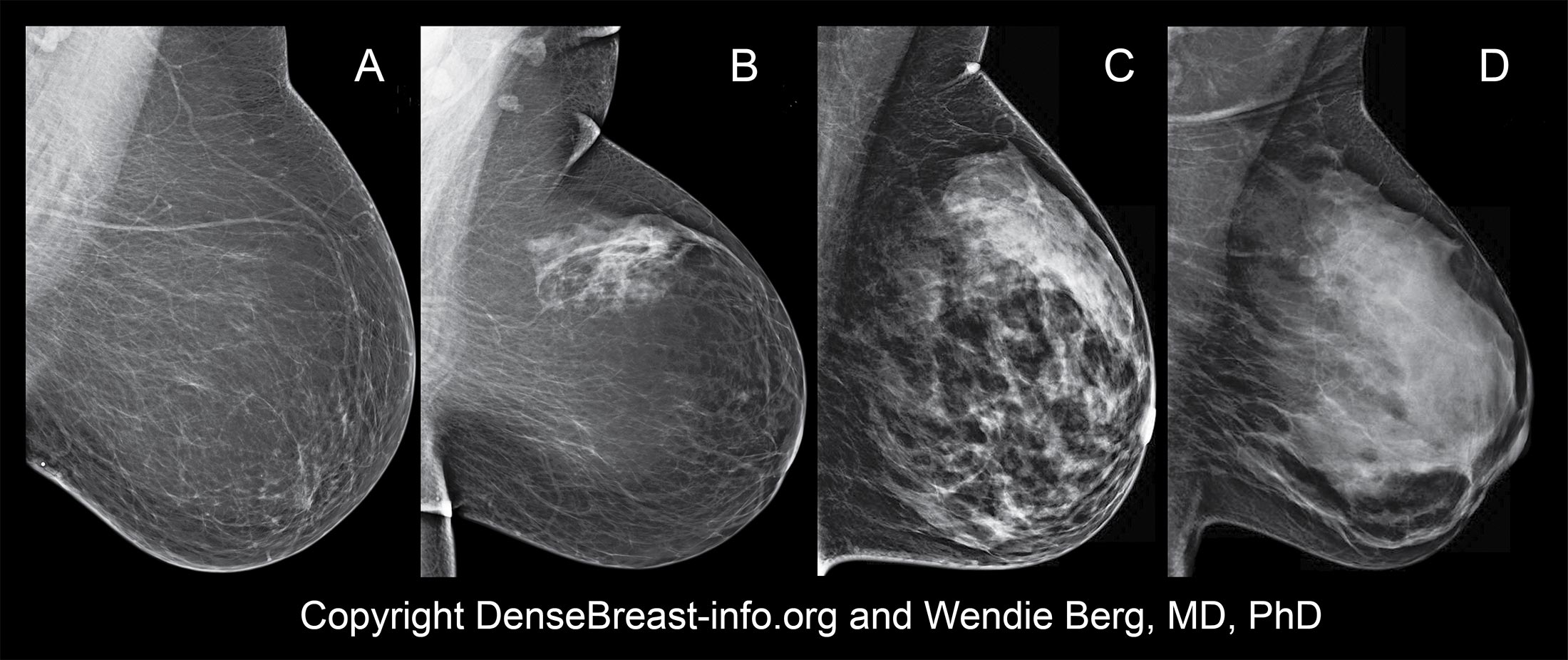What are Dense Breasts, and why does it matter?
Dense breasts have more fibrous and glandular tissue, which appear white on a mammogram. Cancerous tumors also appear white, making them more difficult to identify within dense breasts. Fat is radiolucent, appearing black on a mammogram. This creates a greater contrast against “white” cancerous tumors – making them easier to identify within fatty breasts.
An estimated 40% of women age 40+ are categorized as having dense breasts. Having dense breasts increases your risk of breast cancer and lowers the likelihood of finding cancer while it is still in its early – and more treatable – stages.
At Montclair Breast Center, breast density classification and further possible risk factors are discussed with all patients by their examining physician on the day of their mammogram. Women with dense breasts often benefit from additional screening.
 Courtesy of Dr. Wendie Berg, http://densebreast-info.org/
Courtesy of Dr. Wendie Berg, http://densebreast-info.org/
What is a Mammogram?
At Montclair Breast Center we offer 3D Mammograms (Breast Tomosynthesis). The procedure takes the same amount of time as a traditional mammogram, and often there is less discomfort than traditional mammography.
Learn More: 3D Mammogram
I have dense breasts, now what? Do I still need a mammogram?
However, up to 50% of cancers will not be seen on a dense mammogram. Fortunately, there are supplementary diagnostic studies that can be used in addition to mammograms for women who have dense breasts. An ultrasound or MRI, in addition to a mammogram, significantly increases detection of early stage breast cancers in dense breasts.
If you have dense breasts, we will develop a customized surveillance program, and an ultrasound or MRI may be recommended. Your doctor will determine the best screening and diagnostic tools based on your individual circumstances and breast density.
Learn More: Is My Mammogram Enough? (Information from DenseBreast-info, Inc.)
What is a Breast Ultrasound?
Images are displayed on a video monitor that both you and the radiologist view, and discuss, together. Montclair Breast Center uses breast ultrasound liberally as both a screening and diagnostic tool.
Learn More: Breast Ultrasound
What is a Breast MRI? (Magnetic Resonance Imaging)
Radiofrequency waves capture a three dimensional image of the breast after injection of an intravenous contrast agent. The contrast agent resides more heavily in areas of the breast with increased blood flow. Malignant tumors exhibit an increased number of blood vessels, and therefore will be enhanced on an MRI.
Unlike mammography, Breast MRI uses no radiation.
Learn More: Breast MRI
Additional Resources
- Why Breast Density Matters by Montclair Breast Center’s Dr. Stacey Vitiello, Radiologist and Fellowship-trained Breast Imager
- “Even with the best digital technology and the most experienced reader, a cancer will not be detected mammographically in up to half of women with dense breasts, when there is actually a cancer present.” (continued)
- Many women still unaware of breast density as cancer risk factor by Kate Madden Yee, March 2015
- “Nearly half of women who are eligible for mammography screening have never heard of breast density, and approximately half are unaware of breast density’s effect on cancer detection and risk, according to a new study published online in the Journal of Clinical Oncology.” (continued)
- The Collateral Damage of Being at Average Risk of Breast Cancer and Having Dense Breasts Nancy M. Cappello, Ph.D., Director & Founder of Are You Dense Inc. & Are You Dense Advocacy Inc.
- “The masking of dense tissue, resulting in a missed positive cancer, seldom receives the interest as the harms of a false positive. Where physicians and researchers are… concerned with false positives, there are no guidelines to protect average risk women with dense breast tissue from the harms of false negatives. (continued)
- Densebreast-info.org Information resource focused on providing education about dense breast tissue to both patients and health care professionals. Developed as an educational tool, the site reflects the consensus opinion of medical reviewers.
- AreYouDense.org Educating the public about the risks and screening challenges of dense breast tissue and its impact on missed, delayed and advanced stage breast cancer.
- BreastDensity.info A working group of breast radiologists and breast cancer risk specialists, representing academic and community-based practices.
- Dense breast advocacy and legislation:





